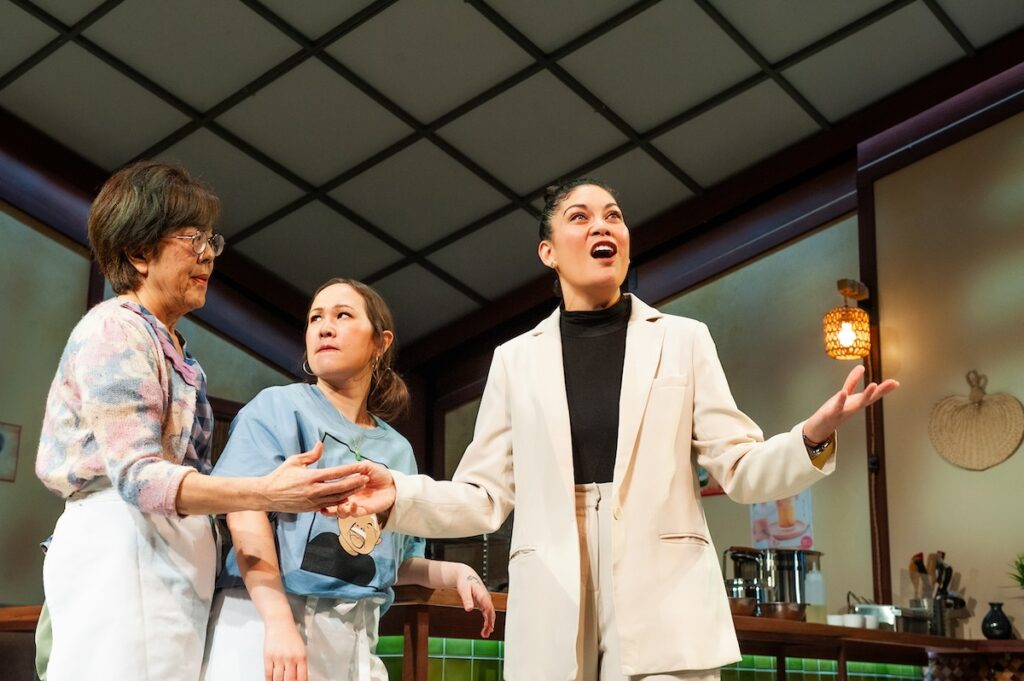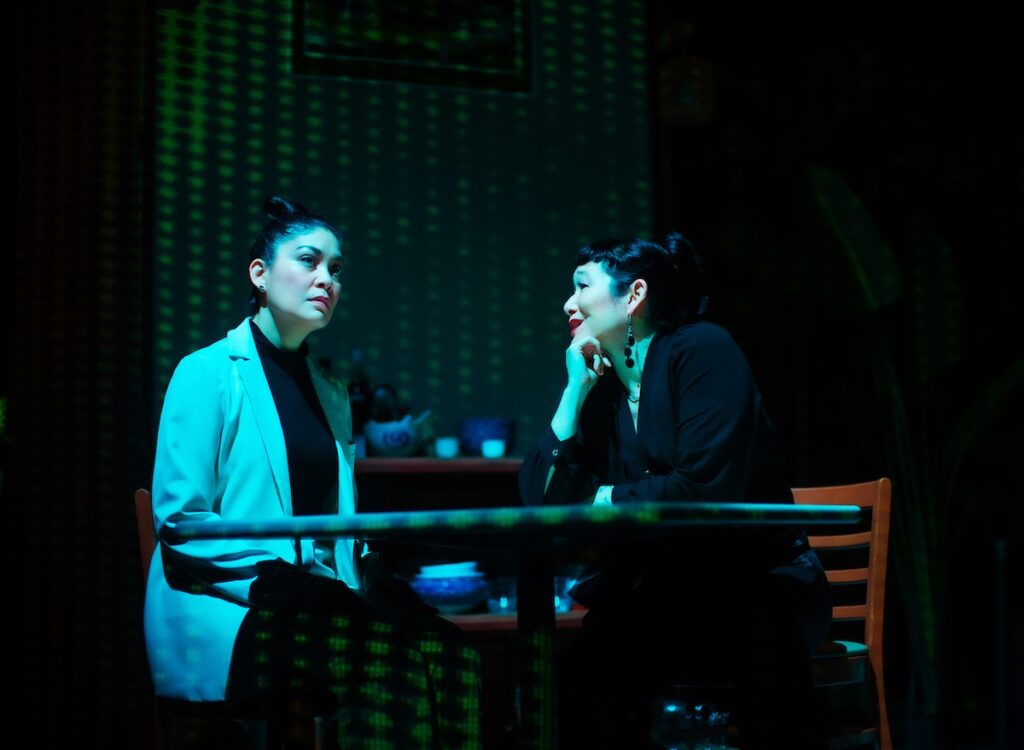How is it that just one year after AI made a big splash the world over that this review covers the second AI-relevant production I’ve seen within a single week (with another Bay Area show on the way from ACT)—yet the COVID pandemic has just finished its fourth no-end-in-sight year, but is portrayed in theatre (and art in general) so rarely that when it does pop up, it’s surprising?
As with the majority of the world’s ills, this too can be blamed on capitalism. The ongoing pandemic is a reminder of the value of the masses and how much money capitalism lost when those in power couldn’t force people to work; AI is used to force workers back into the office, lest they be replaced by an automated alternative that’s not likely to strike over wages and safety. That’s the world we’re in.
This fact isn’t lost on playwright Minna Lee. In fact, it informs much of their new play, My Home on the Moon (world premiere through February 24 at SF Playhouse). Lee’s play follows classic tropes in its use of the big corporate entity trying to squeeze out the small indie business. What sets it apart is the way it looks at why selling out is so tempting in the first place. An “open market” can only thrive if it’s the diametric opposite to a monopoly, but to be a small biz or non-profit is to acknowledge everyday as a Sisyphean struggle just to keep the lights on. What if someone could write a blank check and take all that worry away? What if they offered more than the check, like the ability to give you everything you ever wanted?

These are the questions facing phở restauranteur Lan (Sharon Omi) and her sole employee Mai (Jenny Nguyen Nelson). The latter, a five-star-trained chef, seems to be the only one truly worried about the fate of their hole-in-the-wall eatery, as she pores over bills and debtors’ notices. Lan’s focus tends to be on honoring the memory of her late sister, with whom she opened the restaurant years ago. A sweet sentiment, but it doesn’t pay bills— something made abundantly clear as the two look out the window to see the small bakery across the street torn down.
But things may be looking up. One day, they open the front door to find a gift basket from major telecom NovusCorp, to which Lan had recently applied for a small business grant. Mai is reluctant to take the money of a faceless conglomerate, but both ladies are drawn in by the giant biscotti in the basket. Before they know it, NovusCorp rep Vera (Rinabeth Apostol) appears at the restaurant to pitch the benefits of the grant. With all the grace of an AI-written press release, Vera explains that her company will have to completely take over the restaurant for it to be successful. It’s the sort of offer that seems too good to be true. In fact, you could say the same about Vera.
I’m hesitant to say anymore, lest one pick up the twist (fair warning, spoiler ahead—although it’s pretty much telegraphed in the dialogue the moment Vera sets foot in the restaurant). Suffice it to say, the rest of the story involves obnoxious social media influencers, absent-minded programmers (both played by Will Dao), a steely villainess (played by the always great Erin Mei-Ling Stuart), and an ending that was sad, if predictable. It’s one of those sci-fi tales about how humans often reject artificiality because it tends to be perfect, something we inherently despise. There’s an uncanny valley effect to it that forces us to focus on the one thing wrong rather than the many things right. It’s a survival instinct that’s served us well as a species, which is why a soulless conglomerate with endless revenue would try to conquer it so vehemently.

In that regard, My Home on the Moon’s imperfections add to its realness. It’s occasionally stilted dialogue and a few character choices that seem-odd-even-in-hindsight all smack of human error. One of the major sticking points of last years groundbreaking WGA strike was the writers pushing back against the use of AI by studios. As the tech continues to plagiarize artists and journalists (even those on this very website), there’s something comforting about the Tao te Ching-style embrace of the imperfect to create a recognizable human quality.
The cast certainly strive for perfection under the direction of Mei Ann Teo. Much like her co-star Erin Mei-Ling Stuart, Rinabeth Apostol’s casting in a project is often reason enough to seek that project out. (Is this their first production together?) Coy as I am in my description, you’ve probably guessed the secret about Apostol’s character Vera. It’s an old trope, but she brings hilarity to her version of Lt. Data, her myriad expressions putting a ghost in the machine. Dao’s characters are all ridiculously over-the-top, but he makes them entertaining, if not too deep. Omi’s take on Lan is fine, but could have done with a bit more quiet introspection. I’ve probably seen Jenny Nelson before, but can’t recall. Suffice it to say, she makes you want to see Mai succeed, both as a chef and as someone in love.

Plus, the rotating sets were designed by Tanya Orellana, so their detail was always eye-catching, although I didn’t pick up on the bamboo plants ‘til they were explicitly mentioned in the script.)
As I attended possibly the only COVID-safe performance of the show’s run (Playhouse limits them to the first Friday of each month), I was happy to hear the house manager be a bit of a hard-ass and lean heavy into the mask requirement in the lobby speech before the house opened. It was so direct that I started to wonder if my past chastising of the Playhouse played a part. Some audience members entered without masks, but they seemed pretty good about wearing them for the show proper. Plus, the Playhouse still boasts a great, if chill-inducing, HVAC system: My Aranet4’s CO² readings peaked at 558ppm by the end of the show, which has to be a personal record for indoor shows over the past four years.
It’s jarring for me to see a show about a small biz threatened by AI, given that I just directed for theatre company now struggling to keep their doors open. It’s to the credit of My Home on the Moon (produced by one of SF’s most lavishly donor-backed companies) that this element rings most true in Lee’s script. An able cast and director transform the minor flaws into something that complements the rest of proverbial recipe well. An Asian-focused queer sci-love story should have room to be imperfect. In nothing else, that’s what makes it unique.
MY HOME ON THE MOON’s world premiere runs through February 24 at the SF Playhouse. Tickets and further info here.







